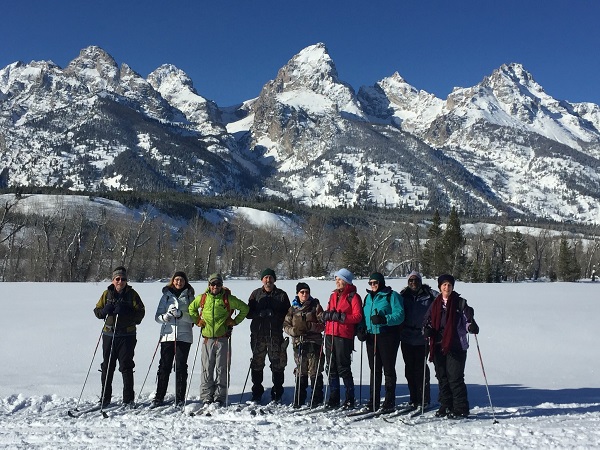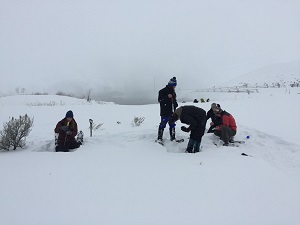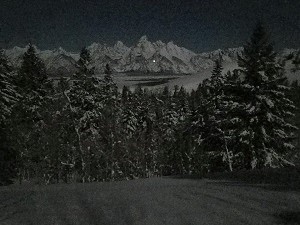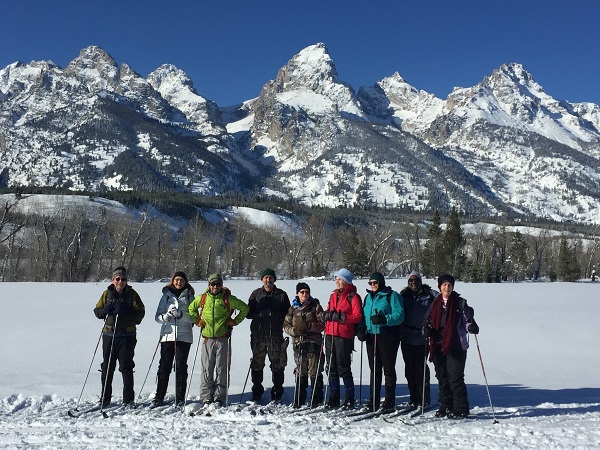
Transitions are never easy, but some are tougher than others. Each and every day is a transition from one to the next. We all experience highs and lows, peaks and valleys, but each with a different lens. Science has always been my lens. It has provided me with an objective outlook on which to build an understanding of the world around me.
 Science and a love for the outdoors brought me to Kelly, WY and Teton Science School’s Graduate Program in August of 2015. I spent a year immersed in Grand Teton National Park, studying ecology and educational pedagogy in an intentional culture unlike any I had ever experienced. After graduating in July of 2016, I returned to my native stomping grounds: Vermont. My tentative plan at the time was to work towards my teaching accreditation and finally get my first “real job.” Yet, as so many at TSS can attest, this valley had a strong pull on my heart.
Science and a love for the outdoors brought me to Kelly, WY and Teton Science School’s Graduate Program in August of 2015. I spent a year immersed in Grand Teton National Park, studying ecology and educational pedagogy in an intentional culture unlike any I had ever experienced. After graduating in July of 2016, I returned to my native stomping grounds: Vermont. My tentative plan at the time was to work towards my teaching accreditation and finally get my first “real job.” Yet, as so many at TSS can attest, this valley had a strong pull on my heart.
It is hard to truly comprehend the impact of an experience until you are fully removed from the environment in which you experienced it. For me, reflection on the graduate program first occurred on the 40-hour car ride back to Vermont. The Tetons encapsulate the notion of power of place, and as the alluvial deposit of Ditch Creek faded into the horizon I suddenly felt numb with nostalgia.
Once at home, Vermont no longer provided me with the sense of wonder and wilderness that sparked my love for the outdoors as a kid. There were no wolves and grizzlies, no need for pepper spray on sojourns through the woods, and no 6,000-foot tower of metamorphic rock at my doorstep. A part of me felt missing. As I attended the orientation to my teaching program, John Muir’s famous words looped through my mind: “The mountains are calling and I must go.”
 The circle of life feels complete in the GYE. It is a place where I feel as though I am a part of the ecosystem rather than apart from it. One of my favorite stories to tell students is about my first wolf encounter. A pair of pronghorn that I spooked reversed course and ran towards me, rather than away, because of the presence of a gray wolf. It is profoundly humbling that in this ecosystem, we humans aren’t the animal that an ungulate fears the most.
The circle of life feels complete in the GYE. It is a place where I feel as though I am a part of the ecosystem rather than apart from it. One of my favorite stories to tell students is about my first wolf encounter. A pair of pronghorn that I spooked reversed course and ran towards me, rather than away, because of the presence of a gray wolf. It is profoundly humbling that in this ecosystem, we humans aren’t the animal that an ungulate fears the most.
Now, back at TSS as a field instructor, I don’t expect to encounter wolves on a daily basis with my students, but I have come to understand the truly transformative properties that this place possesses. Days in the Tetons alter your perspectives, challenge your identity, and forge a relationship between you and your natural surroundings. As students transition back to their homes, this place stays with them – I know from firsthand experience. The lessons learned and the sensations experienced here provide answers to Mardy Murie’s enduring question: “Wilderness itself is the basis of all our civilization. I wonder if we have enough reverence for life to concede to wilderness the right to live on?”


